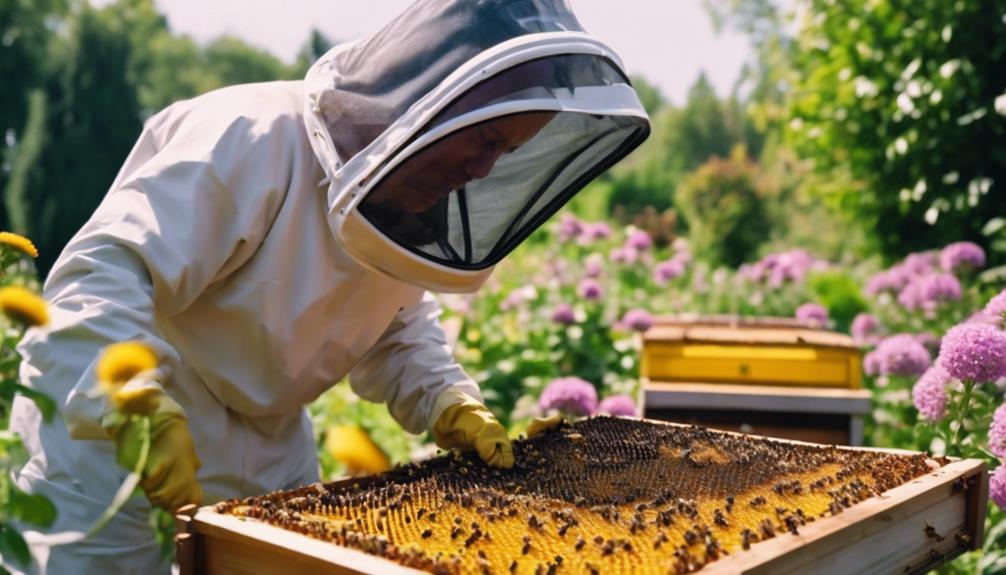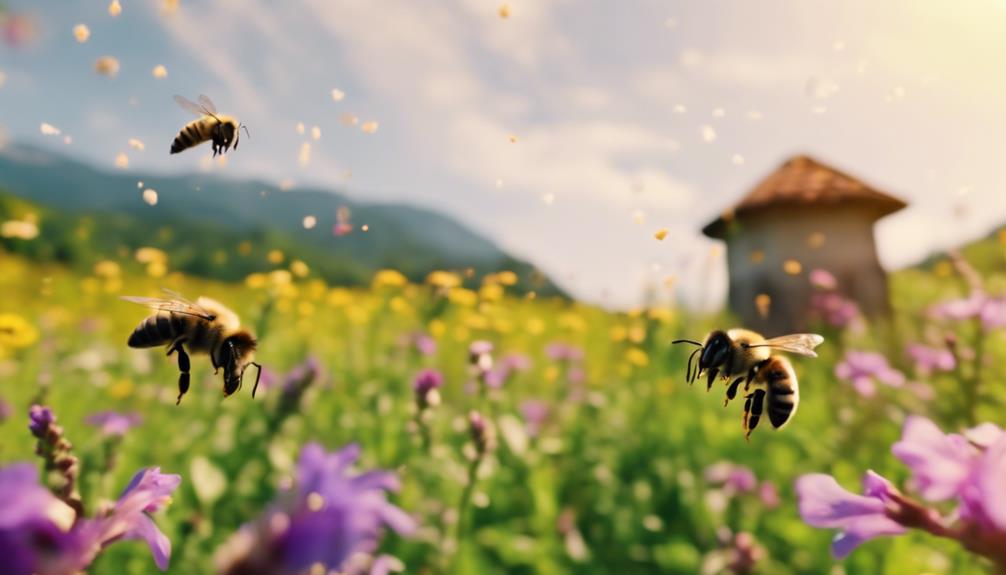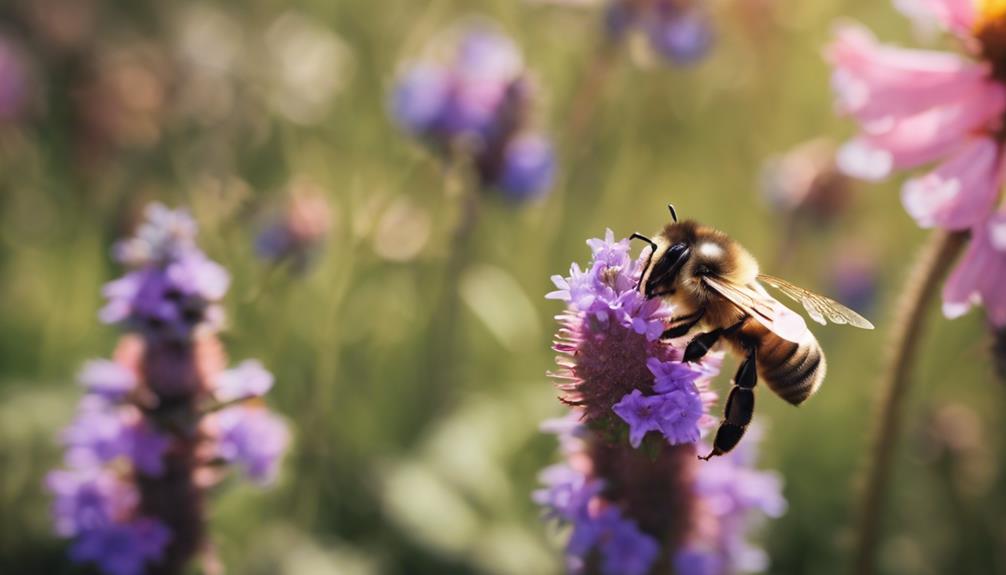Beekeeping is a sustainable practice that not only benefits the environment but also plays a crucial role in maintaining the balance of nature. By practicing natural hive management techniques, minimizing chemical interventions, and supporting bee health, beekeepers contribute to a healthier ecosystem and sustainable agricultural production. Through sustainable resource management, innovation in practices, and ongoing research, beekeeping showcases its potential for a greener future and the well-being of our planet. Interested in exploring more about how beekeeping supports biodiversity and environmental resilience?
Main Points
- Beekeeping promotes environmental sustainability.
- Natural hive management techniques minimize interventions.
- Bee health is crucial for pollination and biodiversity.
- Sustainable beekeeping minimizes chemical interventions.
- Sustainable resource management supports ecosystem balance.
Benefits of Sustainable Beekeeping
Sustainable beekeeping significantly lessens our carbon footprint and fosters environmental sustainability through responsible practices that uphold local bee populations. By nurturing our own local bee populations, we not only reduce the need for long transportation routes but also contribute to the health of our ecosystem.
When we focus on caring for our local bees, we secure the survival of indigenous species and maintain a balanced environment for all living creatures. Sharing colonies and resources with neighboring beekeepers not only strengthens our community but also helps in preserving the delicate balance of nature.
Sustainable beekeeping isn’t just about our bees; it’s about creating a sustainable future for all of us by protecting and supporting our local bee populations.
Natural Hive Management Techniques
Implementing natural hive management techniques involves minimizing interventions to allow bees to thrive in their natural environment while promoting their health and immunity through antibiotic-free practices. By embracing natural processes, we can support the bees in a way that aligns with their instincts and abilities.
Practical management strategies, such as leaving enough honey for winter sustenance and using organic pest control methods, help maintain a balanced hive ecosystem. Keeping hives within their local regions aids bees in adapting to specific environmental conditions, fostering stronger and more resilient colonies.
This hands-off approach not only respects the bees’ natural behavior but also contributes to the overall sustainability of beekeeping practices. Letting nature take its course often yields the most rewarding results in beekeeping.
Importance of Bee Health
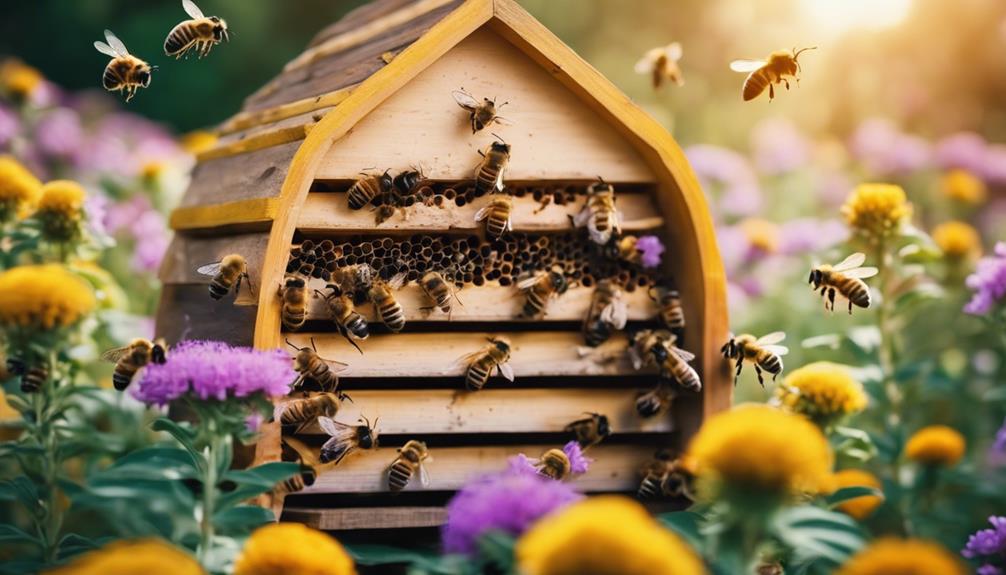
Maintaining bee health is a critical factor in ensuring the pollination of a significant portion of the world’s crops. Bees are the unsung heroes of agriculture, buzzing from flower to flower, facilitating the growth of fruits, nuts, and vegetables that make their way onto our plates. Here are four important reasons why bee health is essential for sustainable beekeeping:
- Crop Pollination: Healthy bees play a pivotal role in pollinating approximately 75% of the world’s crops, ensuring abundant harvests.
- Agricultural Productivity: By maintaining bee health, we support sustained agricultural production, increasing crop yield and quality.
- Ecosystem Balance: Bees contribute to biodiversity and help maintain the delicate balance of ecosystems worldwide.
- Climate Adaptation: The health of bees is crucial for the resilience and adaptation of agricultural systems in the face of climate change.
Minimizing Chemical Interventions
To promote bee health naturally, sustainable beekeeping practices emphasize minimizing chemical interventions like antibiotics in beehives. By steering clear of antibiotic treatments, beekeepers assist in preserving the delicate balance within the hive ecosystem.
This approach not only supports the overall well-being and resilience of bee colonies but also aligns with the principles of sustainable beekeeping. Sustainable beekeepers prioritize employing natural intervention techniques over resorting to synthetic chemical treatments.
Choosing to avoid unnecessary chemical interventions in hives plays a pivotal role in upholding the sustainability of beekeeping practices. Through these conscientious efforts to reduce chemical interventions, we can create a healthier environment for our bees, fostering a more sustainable future for beekeeping as a whole.
Supporting Beekeeping Research
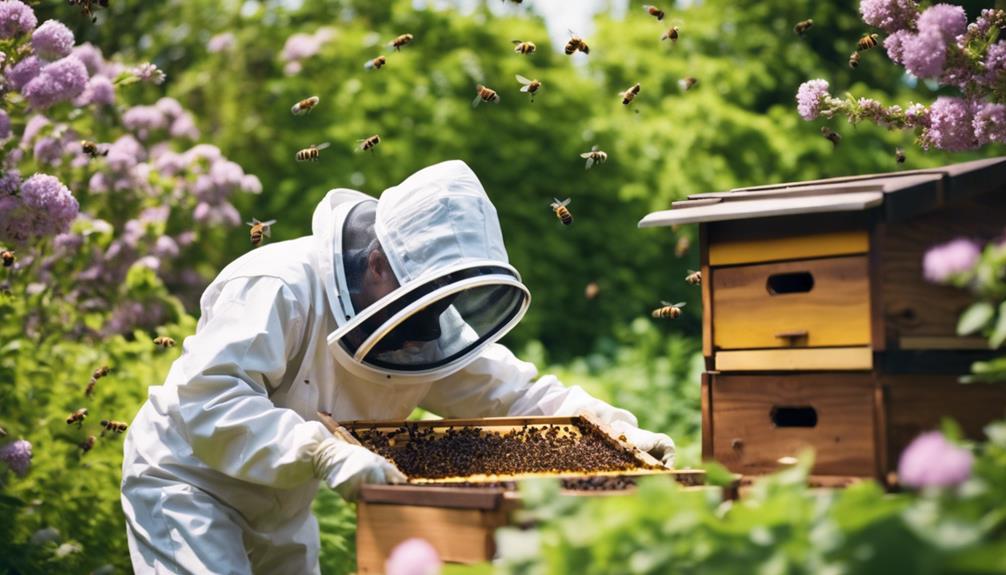
Research in beekeeping actively seeks sustainable practices to support bee populations and biodiversity.
- Investigating Best Practices: Scientists explore the most effective methods for beekeeping that prioritize the well-being of the bees and the ecosystem.
- Understanding the Local Environment: Research examines how beekeeping practices interact with the surrounding environment to guarantee minimal impact and maximum benefit.
- Developing Innovative Solutions: Researchers work to create new techniques and technologies that improve bee health and overall sustainability of beekeeping.
- Sharing Knowledge: The findings from beekeeping research are shared with beekeepers worldwide to promote responsible practices and improve the longevity of bee populations.
Sustainable Resource Management
Sustainable resource management in beekeeping involves utilizing local resources efficiently to support bee populations and maintain ecosystem balance. By focusing on the well-being of our honey bees and the surrounding environment, we can guarantee a thriving ecosystem for both the bees and other local wildlife.
Managing our hives in a sustainable way, such as using natural methods to combat pests and diseases, not only benefits the bees but also contributes to the overall health of our environment. Local bees are well adapted to the area, making them resilient and important for pollination.
Through sustainable practices like minimizing hive interventions and avoiding harmful chemicals, we can help our bees thrive while preserving the delicate balance of nature.
Role of Education in Beekeeping
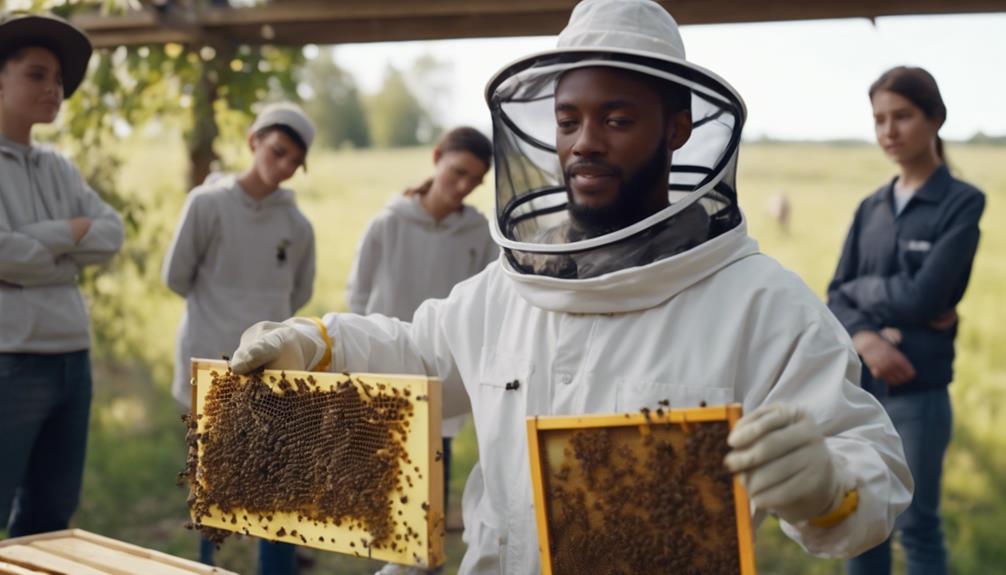
Engaging in beekeeping education equips beekeepers with essential knowledge on sustainable practices and biodiversity conservation.
- Education empowers beekeepers to make informed decisions that benefit bee health and decrease colony losses.
- Proper training improves pollination efficiency, vital for agricultural productivity and ecosystem balance.
- Learning about natural beekeeping methods and disease prevention fosters a more sustainable approach to beekeeping.
- Understanding local flora, foraging patterns, and seasonal variations through education promotes responsible beekeeping practices.
Innovation in Sustainable Practices
Exploring new methods and technologies is key to advancing sustainable practices in beekeeping.
In terms of innovation in sustainable beekeeping, we’re discussing discovering creative ways to care for our buzzing friends while safeguarding the environment.
One exciting development is utilizing substances solely sourced from within the hives. By responsibly collecting honey and pollen, we can guarantee the bees’ well-being and maintain a harmonious balance between nature and our needs.
It’s all about hitting that sweet spot where bee health thrives alongside the economic aspects of beekeeping.
Embracing these new approaches not only benefits the bees but also contributes to the long-term success and preservation of our precious ecosystems.

Hello! My name is Noel Calvin. I graduated from UCLA and now work as a writer at Launch Ninjas. I write blog posts that inspire and guide our readers in their entrepreneurial pursuits. I live in Pleasantville, NJ, with a peaceful yet lively atmosphere that inspires me.
Writing stories is more than just a job for me. It allows me to share my observations and satisfy my curiosity about the world. I combine my analytical skills with creative enthusiasm to delve into technology trends and startup stories. But my life isn’t limited to screens and keyboards. I value loyalty, passion, and a touch of old-fashioned charm, which I infuse into every narrative I create.
I love spending time in my garage, jamming with my band when I’m not writing. Playing the guitar and singing bring me immense joy. I also enjoy capturing ordinary and extraordinary moments through my camera lens and exploring new culinary adventures that excite my taste buds. I’m always seeking new experiences.
My family is very important to me. Joyful Sunday brunches filled with laughter and intense board game nights keep me grounded, reminding me of life’s simple pleasures.
In my world, every moment is an opportunity for discovery. Every discovery is a story worth sharing, whether a heartfelt moment at home or the pulse of technological innovations. Join me as I navigate through life, one blog post, one guitar strum, and one heartwarming family dinner at a time.
